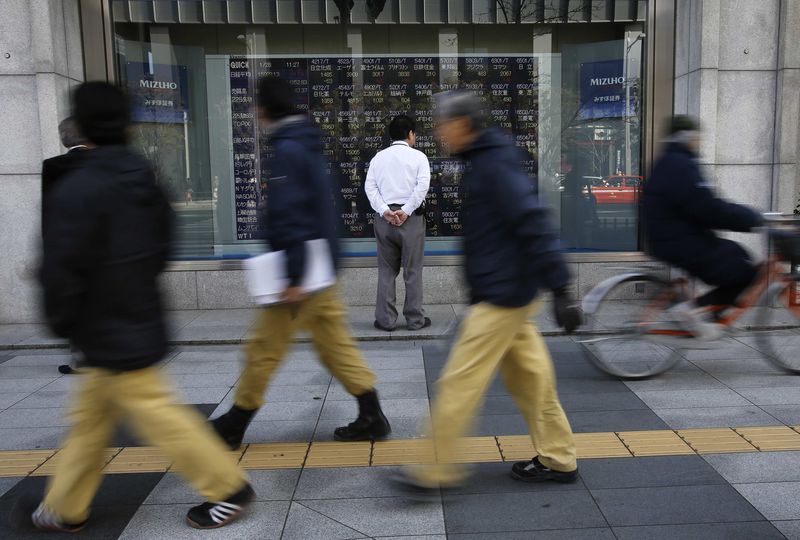By Shinichi Saoshiro
TOKYO (Reuters) - Asian equities were lower across the board on Tuesday as nervousness over Greece potentially withdrawing from the euro and escalating conflict in Ukraine sapped risk appetite, while the dollar lost steam after its payrolls-inspired rally.
Japan's Nikkei (N225) slipped 0.8 percent and shares in Australia and South Korea were also lower. MSCI's broadest index of Asia-Pacific shares outside Japan (MIAPJ0000PUS) stood little changed.
Chinese data offered little help to risk assets, as signs of weakness in the world's second largest economy were reinforced by inflation hitting a five-year low. On the flip side, mounting concern over the slowdown should increase prospects for further stimulus.
Riding on such expectations the Shanghai Composite Index (SSEC) climbed 0.8 percent.
"This will likely be the low point for CPI inflation given that oil is rebounding. Still, the data will increase rate cut expectations and we see a cut in March," said Dariusz Kowalczyk, senior economist at Credit Agricole in Hong Kong.
Spreadbetters expected European bourses to open flat to a touch weaker as Greece remained in the spotlight, with Britain's FTSE (FTSE) predicted down by as much as 0.1 percent while Germany's DAX (GDAXI) and France's CAC (FCHI) were seen starting unchanged.
The probability of Greece leaving the euro zone has risen several notches as the country has taken an increasingly hard line over its government debt.
Prime Minister Alexis Tsipras on Sunday ruled out extending Greece's bailout deal and said some of the reforms imposed by lenders would be reversed.
European Commission President Jean-Claude Juncker raised tensions further on Monday by saying Greeks should not expect the euro zone to accept their latest terms.
"While we are not explicitly forecasting Greece's departure from the euro zone, the initial fall-out in the financial markets could be substantial if it happened and were disorderly," economists at Capital Economics wrote in a note to clients.
"Admittedly, the authorities in the euro zone have put lots of backstops in place to head off any contagion at the pass. But given the rising popularity of anti-austerity parties elsewhere in the region, we doubt investors would be completely convinced that Greece's departure was a 'one-off'."
In currencies, the euro edged up 0.1 percent to $1.1335 <EUR/USD>, having found support for now at a one-week low of $1.1270.
The dollar fell 0.1 percent to 118.48 yen <USD/JPY>, pulling back from a near one-month high of 119.23 reached on Friday in a rally triggered by robust U.S. non-farm payrolls.
Crude oil snapped three days of gains after a preliminary survey showed that U.S. commercial crude stockpiles hit a record high last week.
It jumped on Monday as OPEC forecast greater demand for crude this year than previously thought and projected less supply from countries outside the producer group. [O/R]

U.S. crude oil was down 1.3 percent at $52.19 a barrel